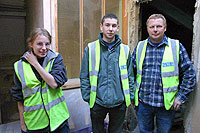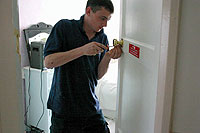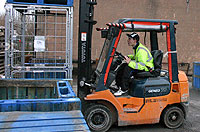Ali Thomas provides an overview of a project that engaged with disadvantaged young people to provide them with construction and related training and qualifications.
 Background
Background
As part of efforts to improve service user engagement in decision-making, Conwy Housing Services and Cymdeithas Tai Clwyd jointly manage a project that aims to develop mechanisms for young homeless people’s participation in service development. In 2005, Youth Homeless Outreach Worker, Angela Watt, conducted a consultation exercise exploring young homeless people’s needs and aspirations around temporary accommodation. The young people identified self-build as a way of giving them training and work experience in construction, as well as the opportunity to live in a property they themselves helped to build.
Conwy Head of Housing, Andrew Bowden, realised that the scheduled conversion of two properties into young people’s temporary accommodation could offer an immediate opportunity to try out such a scheme. It was felt that public concerns around the two developments might be allayed if young homeless people contributed to the building work and developed a sense of ownership of the properties. It was also felt that the project could help challenge negative stereotypes by demonstrating the positive contribution that young homeless people can make to society.
Conwy Housing’s Community Development Coordinator was seconded to develop the Build4Life project, and a multi-agency steering group was established, including representatives from:
- Jobcentre Plus (JCP)
- Careers Wales
- Working Links
- Cymdeithas Tai Clwyd
- NACRO Youth Choices, and
- Conwy County Borough Council Pathways Team
It was agreed to recruit two teams of three young people, and that each team would follow a short induction course followed by six months\’ work experience with the firms carrying out the refurbishments. Work was scheduled to start on the first property in September 2006.
 Putting the project into practice
Putting the project into practice
The first recruitment drive in June 2006 attracted twelve applicants from the target group of local young people living in temporary accommodation. Later in the year, a further fifteen applied to join the second group, by which time the eligibility criteria had been broadened to include young people with backgrounds of unemployment, educational underachievement, in or leaving care, or at risk of offending behaviour. An interview process whittled the applicants down to the final six.
Meanwhile, the steering group concentrated on the practical workings of the scheme. With no allocated budget and with little time to prepare grant-funding applications, the project had to be creative about how to cover the costs of training and wages. It was felt that working through agencies such as Jobcentre Plus, Careers Wales and Working Links would add value to existing provision and give the project long-term sustainability.
While it did turn out to be possible to provide the training in this way, the processes were complicated, and it took several months to find a way through the maze of options to put together a training programme for a group of learners of differing ages and benefit eligibility. It also meant that the project had limited flexibility in what training it could offer. It had been hoped to run a practical course to inspire those disengaged from education. However, funding through JCP New Deal was dependent on learners achieving qualifications and/or job outcomes; this meant that JCP was initially only able to fund a classroom-based course leading to a Construction Skills Certification Scheme (CSCS) certificate.
To fill the gap, one of the project partners funded a two-week practical course. By the time the second course was organised, the project had sourced funding support from Genesis Cymru, Conwy Community Safety Partnership and Cymorth via Conwy\’s Young People\’s Partnership. This additional funding allowed the project to provide forklift truck training and driving lessons. The project was also successful in attracting funding from the Links Foundation for transport, teambuilding activities and personal toolkits.
The next challenge was to establish a funding source for weekly wages or training allowances. During their training, the over-18s were able to claim benefits through JCP\’s New Deal programme. However, there was no equivalent facility for the under-18s, and no route for any of the trainees to remain in receipt of benefits during work experience. Conwy Housing eventually agreed to pay the trainees a wage out of the renovation budget, with JCP providing a wage subsidy for those on New Deal.
Unaware of these challenging issues behind the scenes, the first group of trainees started their preparatory training in August 2006. As well as a basic induction, the course offered an opportunity to assess the trainees\’ commitment and address any issues around timekeeping and attendance. When they joined the project, most of the trainees were unused to getting up early and working structured days, and the Project Co-ordinator worked hard to encourage the trainees, making early morning calls, buying alarm clocks, banging on doors and throwing stones at windows. The Project Co-ordinator, Youth Homeless Outreach Worker and staff from various supporting agencies continued to provide support for the trainees throughout the project.
After initial problems with timekeeping, attendance was generally excellent despite the early starts and long journeys on public transport. The CSCS certificate, a pre-requisite for work on a building site, proved popular with the trainees, especially as the classroom-based course was made more interesting by the inclusion of site visits and by the addition of some practical sessions. The trainees gained CSCS, manual handling, abrasive wheels, first aid and risk assessment certificates, as well as forklift, cherry picker, scissor lift and telescopic handler licences.
The trainees from the first group started their six-month contract with GM Jones Ltd in September 2006. They gained experience in a broad range of trades, including plastering, painting and decorating, tiling, and joinery. They completed the contract with 100% attendance.
Due to hold-ups with planning permission on the second refurbishment scheme, the second group of trainees were invited onto a work placement with Housing\’s Building Maintenance responsive repairs team. One of the group opted to take advantage of an alternative offer of work with a local forklift company. The remaining trainee started work with Building Maintenance and gained a range of experience in joinery and plumbing.
Evaluation
 Sadly, it proved beyond the project\’s means to offer NVQs within the time available. Also, the original concept of the group moving into the refurbished accommodation was not realised, as those who stayed the full course were suitably accommodated elsewhere by the time the scheme was completed. Yet despite these setbacks, in the end-of-project evaluation the trainees agreed that Build4Life had given them a unique opportunity, and had more than met their expectations. All had previously failed in their attempts to get work in construction, and felt that Build4life\’s guaranteed six months\’ work placement offered them an opportunity to gain practical skills and experience in a real working environment, as well as life skills such as confidence-building, anger management and budgeting. In particular, they identified that the ongoing and consistent support set Build4Life apart from other training schemes:
Sadly, it proved beyond the project\’s means to offer NVQs within the time available. Also, the original concept of the group moving into the refurbished accommodation was not realised, as those who stayed the full course were suitably accommodated elsewhere by the time the scheme was completed. Yet despite these setbacks, in the end-of-project evaluation the trainees agreed that Build4Life had given them a unique opportunity, and had more than met their expectations. All had previously failed in their attempts to get work in construction, and felt that Build4life\’s guaranteed six months\’ work placement offered them an opportunity to gain practical skills and experience in a real working environment, as well as life skills such as confidence-building, anger management and budgeting. In particular, they identified that the ongoing and consistent support set Build4Life apart from other training schemes:
\’There is help to deal with things if you\’re worried about anything. There is someone to check up to see how you\’re doing, we feel more looked after, feel like we\’re getting somewhere.\’
Case study 1
Lindsey Roberts was unemployed when she heard about Build4Life from her leaving care worker. She had tried on repeated occasions in the past to gain a joinery apprenticeship, but with no success, partly due to her lack of a driving licence. Lindsey shone during her employment with GM Jones Ltd, and impressed her employers with her skills and attitude, as well as her ability to hold her own with the otherwise exclusively male workforce. When Build4Life finished, GM Jones offered her a further contract of work, dependent on her gaining her driving licence within six months. She is currently taking driving lessons funded by the Conwy Community Safety Partnership, and is making excellent progress. Recently, Lindsey has secured a place in Llandrillo College to pursue her long awaited dream of a joinery apprenticeship.
Case study 2
Tom McCullum was seventeen and not engaged with employment, education or training when he was encouraged by his Careers Wales Keeping in Touch worker to apply for Build4Life. After a hesitant start, his interest picked up when he started the forklift truck training, and he gained a range of licences with flying colours. His colleagues in Housing\’s Building Maintenance team spoke highly of his cheerful personality and his excellent practical skills. Although he has enjoyed his placement with the team, he is keen to pursue a career using plant machinery. He is now well placed to do this, with an extremely impressive CV for an eighteen year-old, and is planning to attend job search sessions with Careers Wales.
An evaluation with the project partners identified the multi-agency nature of the project as a critical factor in its success. Members of the steering group played a vital role in bringing knowledge and expertise to the planning and shaping of the scheme and worked hard to overcome barriers. The project also maintained excellent working relationships with employers and training providers. All parties embraced the project wholeheartedly, often providing additional services and resources to tight deadlines, and key individuals acted as champions for the project. All identified a sense of ownership of the scheme, and a belief in the mutually agreed aims and objectives.
What next?
While the pilot scheme has now finished, links have been made with a multi-agency group in the neighbouring county of Denbighshire. Together, the counties are looking at developing a project that will use social clauses to capitalise on the opportunities offered by Welsh Housing Quality Standard and other planned maintenance and refurbishment contracts. A consultation event is planned with representatives from across the sectors to critically appraise the proposed model with a view to seeking funding.
Build4Life demonstrated that it is possible to tap into the potential offered by local regeneration projects to engage with disadvantaged young people. A scheme of this nature benefits everyone:
- construction companies facing skills shortages
- employment agencies seeking training and job outcomes
- support agencies seeking positive outcomes for their clients
- social landlords seeking to provide holistic solutions to issues of social exclusion, and
- most importantly, the young people themselves
\’It offers young people like us a better start in life. It helps people who think they\’ve got nothing to have something.\’
Ali Thomas was Build4Life Project Co-ordinator.